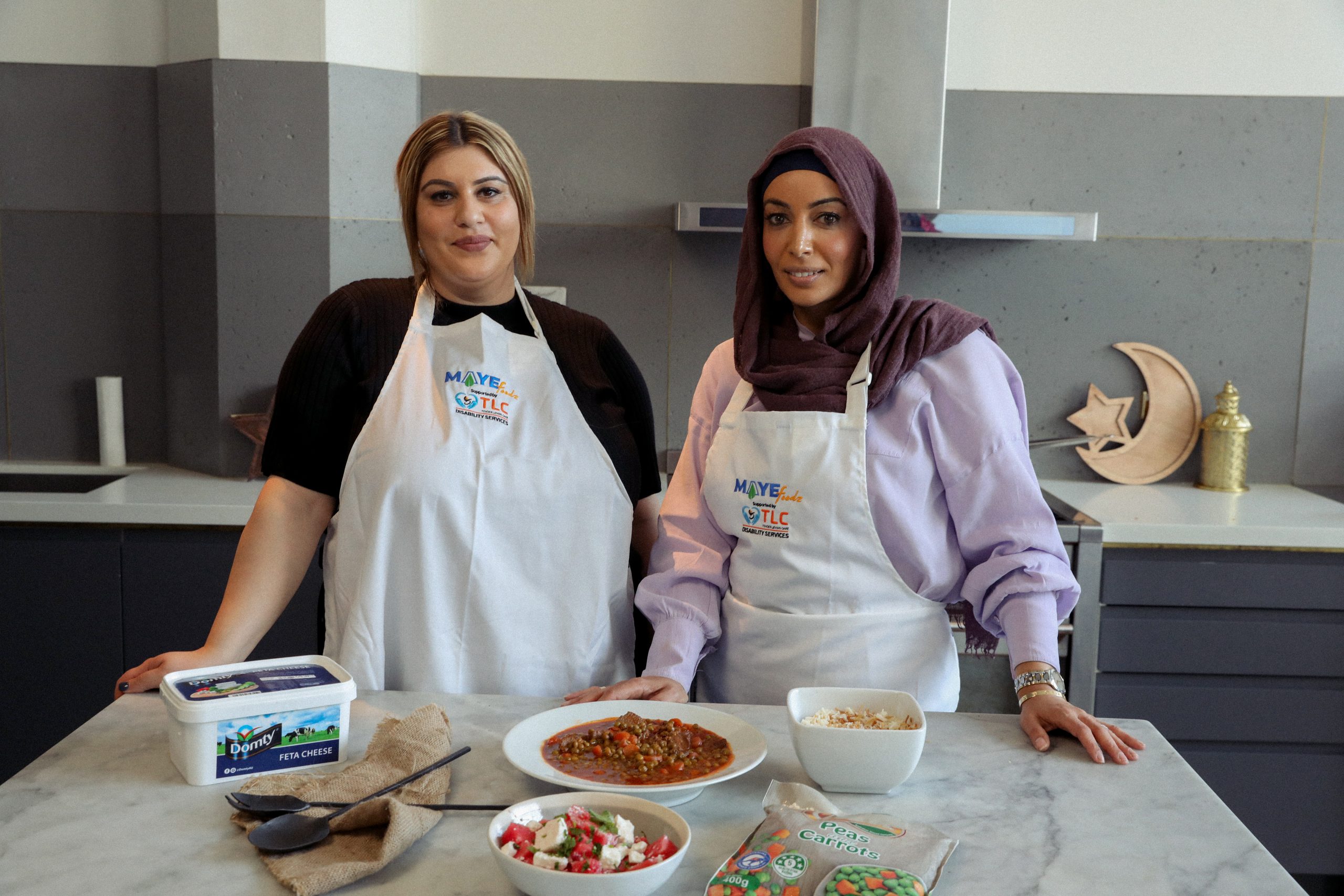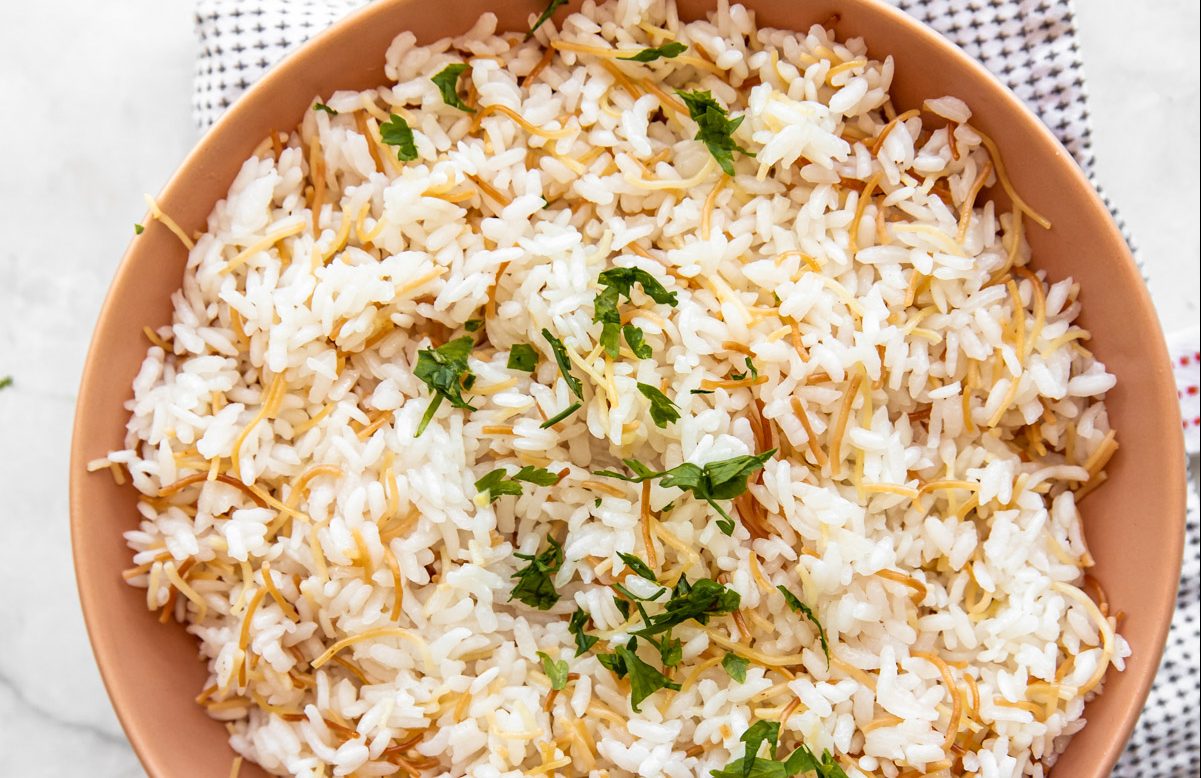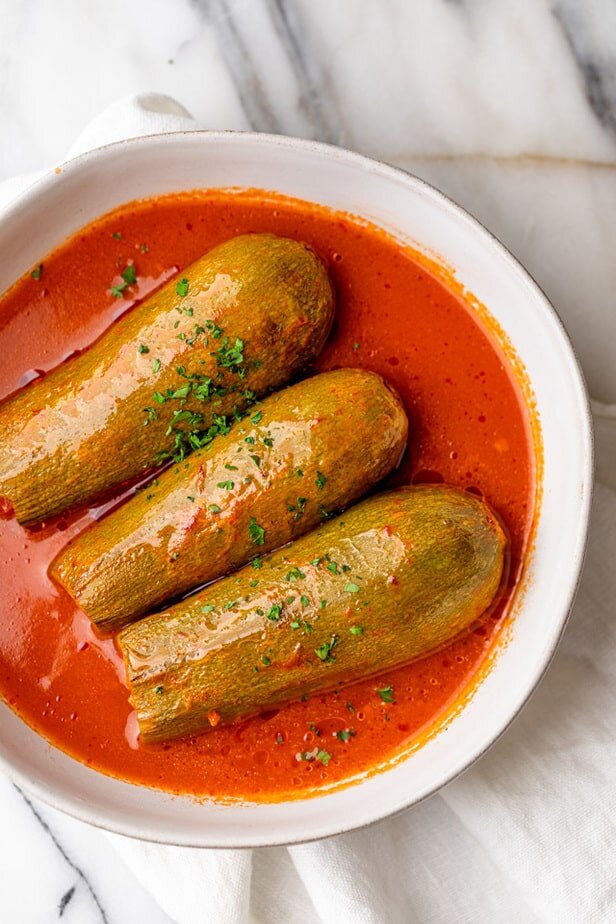Amera’s Bezela Wa Roz (Pea & Meat Stew)
 Egypt
Egypt 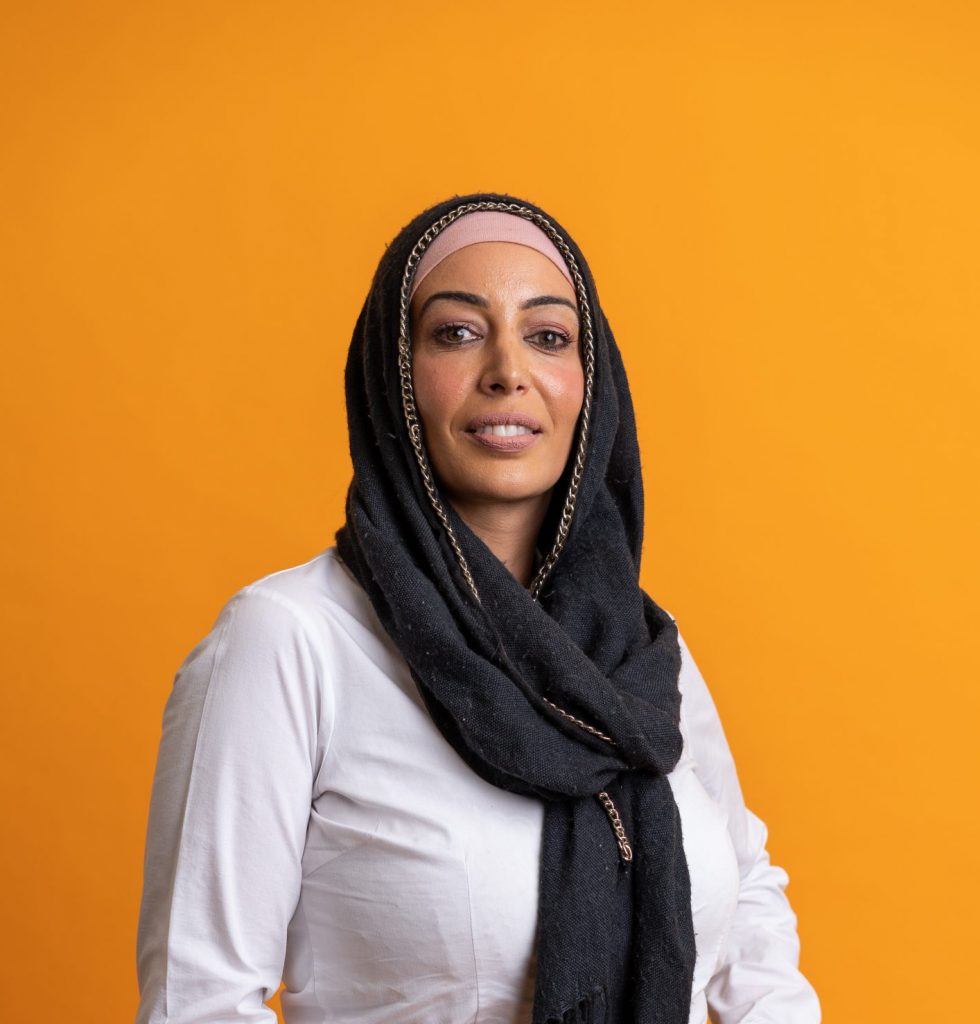
My story is one of learning to accept myself and the culture I was born into – and food played a part in that.
Australian-born, I grew up in The Shire in South Sydney. My parents were born in Egypt – Mum in Alexandria, Dad in Cairo. They divorced young, and I went to live with my mum. I attended the local Catholic school, where most of my friends were Anglo-Australian. Most of the area was Anglo-Australian and as a young Muslim girl, I felt I had to fit in to survive. The true nature of my culture and family had to become invisible and that kind of thinking became a habit to the point where I’d be embarrassed to participate in my culture, even at home.
My mum was an amazing cook but, only looking back now, do I really appreciate how good she was. I was a fussy eater. I loved my meat but only plain, no spices or sauces. I’d see my Anglo-friends with their baked vegetables and meats and anything outside of that would feel too foreign, so my mother’s cooking would make me feel foreign. I generally hated vegetables and remember times I would run around the house to escape eating her traditional Bezela and Rice. I didn’t want to try anything new and I didn’t want to accept that this was my culture.
Over time, you hear stories of your parents, how they grew up and what they ate. When they were growing up in Egypt there was a lot of poverty. There still is a lot today. Meat was scarce so meat dishes were padded out with loads of vegetables. It was a nutritious way to feed the family and so a little meat and lots of vegetables dressed up with aromas and spices, sauces and creative thinking became tradition. As I heard these stories, I started to understand the context of the food my mum made and appreciate that this is my heritage and part of my story.
As I grew up, we would hold family BBQs at home, cooking spiced meats. The aroma caught the attention of our neighbours and they became intrigued and praised the food we were cooking – everything from the spiced meat to tahini and hummus to the traditional vegetable dishes I’d never liked: Bezela wa Gazar (peas and carrots), Spanekh (spinach), Bezela (peas), Fesolia (green beans) and Bamya (okra). Suddenly, I realised that I didn’t hate the food mum was making – rather I’d been embarrassed by it. However with the neighbourhood accepting Mum’s cooking, they were accepting me and my family. And that helped me to accept myself.
By the time I was studying for my HSC, I chose subjects around culture and religion and the moment I graduated, I booked a flight to Egypt to follow my pursuit of knowledge to understand who I was. My mother had always wanted us to visit Egypt. She would never say anything negative about it and even now she refers to it as ‘The mother of the world’ – in Arabic: Om el Donya. I fell in love with the history, culture and stories too… and as if by divine timing, I met the love of my life, my husband Yasser.
I had never met most of my relatives but some of our uncles had visited us in Australia and each week when my sister, brother and I went to visit my dad, we would phone his mum, our Teta. Teta’s family were Turkish originally and she was quite a talented pianist with a grand piano in her home. I loved hearing her play and the first thing she would always say was “aaz el weld wa weld el weld” – “I love my son but I love my grandchildren even more”! We would speak to her in Arabic and English but my Arabic was pretty poor so it was quite an adventure arriving in Cairo to meet her on my own.
When I walked in with my suitcase, the first thing I smelt was the beautiful aromatic smell of fresh tomatoes. I asked what she was making and she said ‘Bezela wa Roz’ (Peas and Rice). The surprise I felt was unbelievable. For so long this meal was something I actively avoided, shoving it under my plate or adding it to my siblings’ plates when they weren’t looking. But standing there with Teta that day, with her loving smile and gentle gaze, and this incredible smell coming from the kitchen was like a gentle slap in the face. The very first mouthful changed my life too! There was nothing I could compare it to. I asked Teta to teach me how she makes it and if you ask me now what my favourite dish is, I will always say ‘bezela wa roz’.
Bezela wa Roz literally means peas and rice. It can be made with any meat (beef, lamb, chicken) or just with vegetables. The sauce is always tomato-based. My Teta makes it with fresh tomatoes, making her own tomato paste too. The way I make it is essentially the same way my Teta taught me although I often use a mix of ripe fresh tomatoes, tinned crushed tomatoes and tomato paste for extra depth. For someone who hated cooked vegetables, my special favourite now is Bezela wa Gazar – peas and carrots! It’s my children’s favourite too. I make it at least once a week and each time it brings back memories of my beautiful Teta and the pride in my heritage I should always have.
Meeting Teta was a turning point for me in different ways. That trip to Egypt was one of self-discovery and self-acceptance, learning to accept myself and the culture I was born into and to understand that respecting and loving myself is essential to respecting others.
My increasing fascination with other people’s stories showed me that life comes in all sorts and without compassion, the world is a dark place. After a few years in business and finance, I retrained to work in the disability industry, setting myself a personal goal to improve inclusiveness in society and to empower marginalised communities and individual people’s abilities. Some people need more support than others and there is no greater satisfaction than helping make a difference, supporting them to overcome obstacles and to reach their goals, seeing them live their best lives, and be truly happy, loved and supported. I love assisting adults and children and as a mother of three sons, I always work from the perspective of how I expect my own children to be treated. We are humans working together to survive, and life doesn’t need to be a challenge we experience alone. Together, we can make the world a better place, if we start with the vision, empathy and passion for it.
In our Egyptian and Muslim culture, sharing food is not just about making sure someone’s fed. It’s an act of hospitality and of charity, symbolising at the most basic level the sharing of what we have. I hope you and your family will enjoy trying some of my family’s traditional Egyptian food as a gift from my family to yours.
Amera Zaki
2021
Share this story
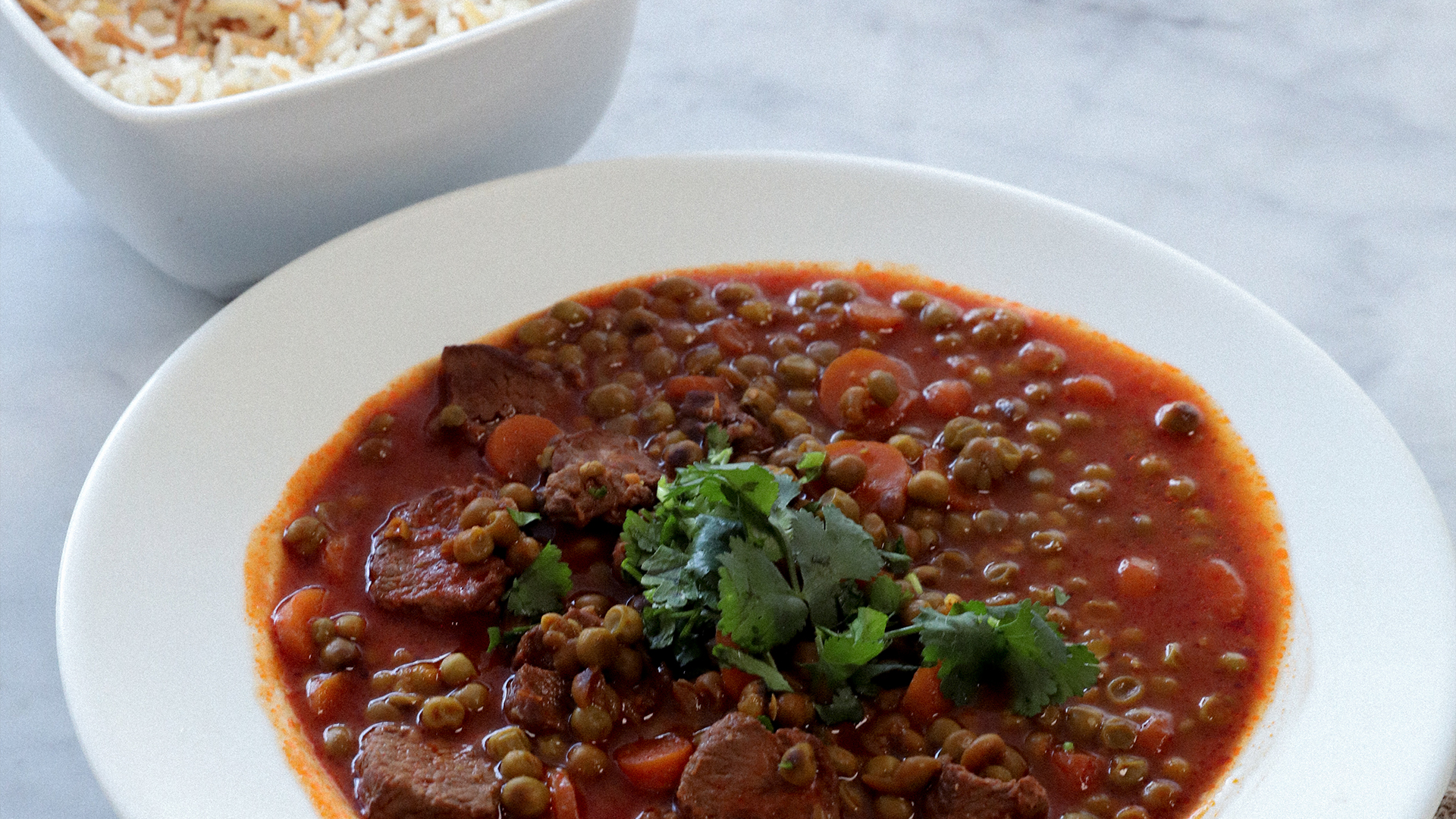
On high, heat 2 tbsp of the oil in a pan. Brown the diced onion. Add the lamb and sear to get some colour on the meat and seal it.
Stir the chopped fresh tomatoes, tinned crushed tomatoes and tomato paste into the lamb. Then crumble the chicken stock cube into the pan and stir thoroughly. Add a generous pinch of salt and pepper.
Cover and lower the heat to a simmer for 1-1.5 hours or until the meat is tender. Check every 15-20 minutes and add a cup or two of water if the mixture is getting too thick. Adjust seasoning to your taste.
When the stew is ready, warm the third tbsp of oil in a small pan and fry the garlic until soft and golden – not crispy (don’t have the oil too hot). Add the fresh coriander to the garlic and stir. Sprinkle the garlic and coriander on top of the stew, stirring to mix through.
Serve with Egyptian style small grain rice with vermicelli noodles – available in Middle Eastern grocery stores or see my recipe to make your own.
Variations can be made by replacing the peas and carrots with okra or any other vegetable. And/or replacing the lamb with beef or chicken. Some people also like to add extra spices like cumin or cardamom and bay leaves. If you do, add the herbs and spices before leaving to simmer.
